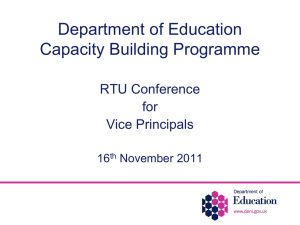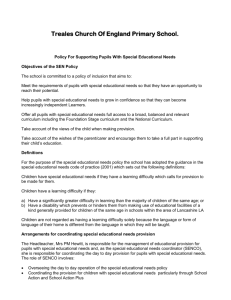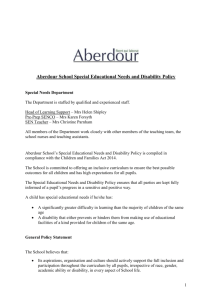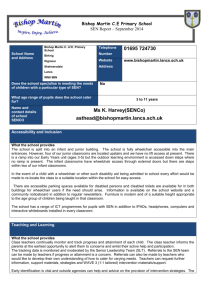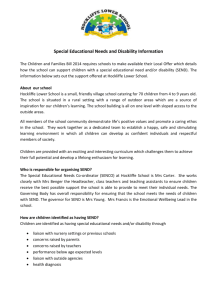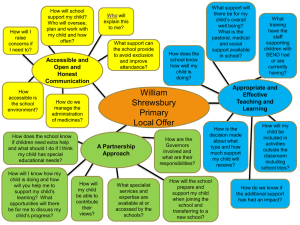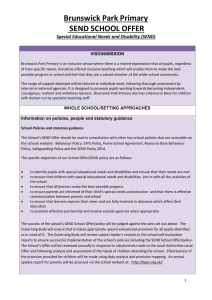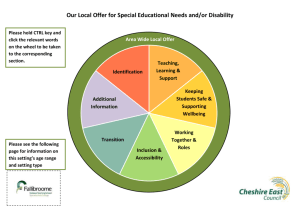School SEND information
advertisement
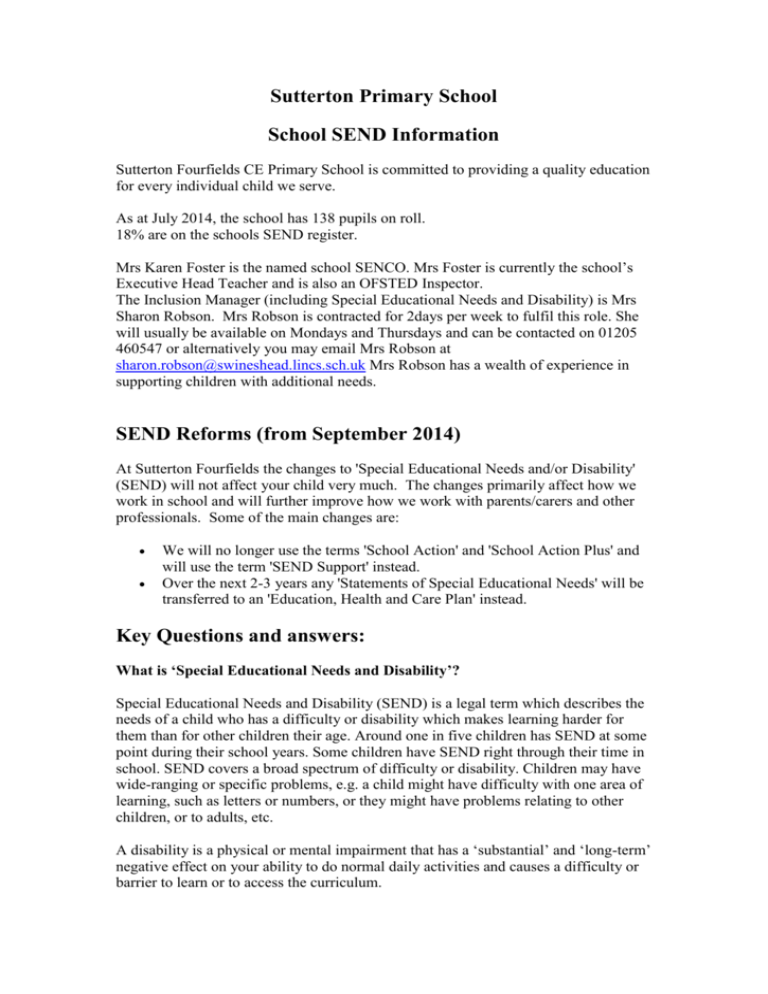
Sutterton Primary School School SEND Information Sutterton Fourfields CE Primary School is committed to providing a quality education for every individual child we serve. As at July 2014, the school has 138 pupils on roll. 18% are on the schools SEND register. Mrs Karen Foster is the named school SENCO. Mrs Foster is currently the school’s Executive Head Teacher and is also an OFSTED Inspector. The Inclusion Manager (including Special Educational Needs and Disability) is Mrs Sharon Robson. Mrs Robson is contracted for 2days per week to fulfil this role. She will usually be available on Mondays and Thursdays and can be contacted on 01205 460547 or alternatively you may email Mrs Robson at sharon.robson@swineshead.lincs.sch.uk Mrs Robson has a wealth of experience in supporting children with additional needs. SEND Reforms (from September 2014) At Sutterton Fourfields the changes to 'Special Educational Needs and/or Disability' (SEND) will not affect your child very much. The changes primarily affect how we work in school and will further improve how we work with parents/carers and other professionals. Some of the main changes are: We will no longer use the terms 'School Action' and 'School Action Plus' and will use the term 'SEND Support' instead. Over the next 2-3 years any 'Statements of Special Educational Needs' will be transferred to an 'Education, Health and Care Plan' instead. Key Questions and answers: What is ‘Special Educational Needs and Disability’? Special Educational Needs and Disability (SEND) is a legal term which describes the needs of a child who has a difficulty or disability which makes learning harder for them than for other children their age. Around one in five children has SEND at some point during their school years. Some children have SEND right through their time in school. SEND covers a broad spectrum of difficulty or disability. Children may have wide-ranging or specific problems, e.g. a child might have difficulty with one area of learning, such as letters or numbers, or they might have problems relating to other children, or to adults, etc. A disability is a physical or mental impairment that has a ‘substantial’ and ‘long-term’ negative effect on your ability to do normal daily activities and causes a difficulty or barrier to learn or to access the curriculum. What should I do if I think my child has Special Educational needs? Your first point of contact should be your child’s class teacher. Concerns can be discussed at parents’ evenings which are held twice a year, or by making an appointment to meet with your child’s class teacher at any point throughout the school year. This information can then be passed on to the relevant staff members within the school. The class teacher is responsible for: Checking on the progress of your child and identifying, planning and delivering any additional help your child may need (this could be things like targeted work, additional support) and letting the Head teacher and SENCO (Special Educational Needs Coordinator) know as necessary. Writing SSPPs (SEND Support Profile Plans), and sharing and reviewing these with parents three times a year. Ensuring that all adults working with your child in school are supported to deliver the planned work/programme for your child so they can achieve the best possible progress. This may involve the use of additional adults, outside specialist help and specially planned work and resources. Ensuring that the school’s SEND Policy is followed in their classroom and for all the pupils they teach with any SEND. The SENCO is responsible for: Coordinating all the support for children with SEND and developing the school’s SEND Policy to make sure all children get a consistent, high quality response to meeting their needs in school. Ensuring that you are involved in supporting your child’s learning, kept informed about the support your child is receiving, and involved in reviewing how they are doing. Liaising with all the other people who may be coming into school to help support your child’s learning e.g. Specialist Teaching and Applied Psychology Service (STAPS) currently Mrs Wendy Overton. PATHWAYS (Behavioural Outreach Support). Autism Outreach currently Anthony Bowen. Speech and Language Therapy Service. Community Paediatrician. School Nurse Team. Child and Adolescent Mental Health Service. Relate. Family Support Workers. Updating the school’s SEND register (a system for ensuring all the SEND needs of pupils in this school are known) and making sure that there are excellent records of your child’s progress and needs. Providing specialist support for teachers and support staff in the school so they can help children with SEND in the school achieve the best progress possible. The Executive Head Teacher is responsible for: The day to day management of all aspects of the school, this includes the support for children with SEND. She will give responsibility to the SENCO and class teachers but is still responsible for ensuring that your child’s needs are met. She must make sure that the Governing Body is kept up to date about any issues in the school relating to SEND. The SEND Governor is responsible for: Making sure that the necessary support is made for any child who attends the school who has SEND. If you are not happy that the concerns are being managed and that your child is still not making progress you should speak to the SENCO and/or Head teacher. You can also refer to the ‘Special Educational Needs and Disabilities Code of Practice: 0-25 years’ for statutory guidance for organisations who work with and support children and young people with SEND and their parents. (link https://www.gov.uk/government/publications/send-code-of-practice-0-to-25 How will the school respond to my concern? We will always listen to your concerns and discuss the situation. The class teacher will initially listen to any concerns you may have. If your concern cannot be met at that meeting then the class teacher will take some time to look into the concern and liaise with the SENCO and/or Head teacher. A follow up meeting will be arranged to ensure your concern is addressed and to plan any additional support your child may receive. If relevant at this stage, possible referrals to outside professionals to support your child’s learning will be discussed. How will the school decide if my child needs extra support? This will be a collaborative decision based on evidence of your child’s academic and personal progress. Both you and your child will be involved in setting targets and deciding next steps. If your child continues to make limited progress after receiving intervention the school will set up a meeting to discuss this with you in more detail. What will the school do to support my child? This will depend upon your child's individual needs. Each child's needs are unique and so each child will receive different support, depending upon their specific needs. The SENCO and class teacher will decide which strategies and resources are appropriate to support your child's needs. Where outside agencies are involved, they will provide advice about how best to support your child's needs. SEND is divided into four areas. Cognition and Learning (Learning Need). Social, Emotional and Mental Health. Medical, Physical and Sensory Needs. Communication and Interaction (Speech and Language). Quality First Teaching input via the class teacher in excellent targeted classroom teaching For your child this would mean: That the teacher has the highest possible expectations for your child and all pupils in their class. That all teaching is based on building upon what your child already knows, can do and can understand. Different ways of teaching are in place so that your child is fully involved in learning in class within well differentiated ability groups. Specific strategies (which may be suggested by the SENCO or outside professionals) are in place to support your child to learn and progress. Your child’s teacher will have carefully checked on your child’s progress and where there are gaps in their understanding/learning, extra support will be put in place to help them make the best possible progress. All children in school should be getting this as a part of excellent classroom practice when needed. Sutterton Fourfields Primary School is an inclusive school and may offer the following range of provision to support children with SEND: Interventions Social Skills programmes/support including strategies to enhance self-esteem: Practical skills programme for an individual child or small group. Playground buddies. Social stories used to discuss events. Lunch time clubs, jobs and responsibilities offered to alleviate unstructured time. Access to a supportive environment – IT facilities/equipment/resources (inc. preparation): Visual timetables for organisational purposes. Pre teaching of strategies and vocabulary. Access to an ipad. Software to support key areas of learning e.g. Clicker, Number Shark, Nessy etc. Scribe for two-layer writing. Specialist equipment to access the curriculum e.g. writing boards. Strategies/programmes to support speech and language: Interventions from a Speech and Language Therapist. Delivery of a speech and language programme by a TA. Talk partners. Pre-learning of vocabulary. Use of visual strategies to support language. Use of First Call. Mentoring activities: Intervention Resources. Use of peer mentoring. Mentoring support from TA. Access to strategies/programmes to support Occupational Therapy/Physiotherapy needs: Intervention from an Occupational Therapist/Physiotherapist. Delivery of planned programmes by a TA. Provision of equipment advised by specialist. First Move. Strategies to reduce anxiety/promote emotional wellbeing (including communication with parents): Drawing and Talking Intervention. Planned programme of support from. Meet and greet session at the start of the day. Regular parental contact sessions / home school link book. Referral to Relate for family counselling. Referral to Child and Adult Mental Health Service (CAMHS). Work with Family Support Workers (TAC/CIN/CP). Strategies to support/develop literacy inc. reading: Small group support in class through guided teaching. Withdrawal in a small group for planned catch up programmes. Withdrawal for 1:1 planned programme intervention. Support, advice and materials from STAPS. Strategies to support modify behaviour: Use of the school’s behaviour policy. Time out. Individual behaviour support plans (BSP). Social skills/behaviour modification groups. Home/school contact book. Nurture Group. Visual time table. Referral to PATHWAYS. Referral to Autism Outreach. Strategies to support/develop numeracy: Small group support in class through guided teaching. Withdrawal in small group for planned interventions. Withdrawal for 1:1 teaching of planned programme. Provision to facilitate/support access to the curriculum: Small group support from TA. 1:1 support in the classroom from a TA to facilitate access. Use of specialist equipment such as seating. Use of personalised curriculum. Strategies/support to develop independent learning: Use of visual timetables and checklists. Pre-teaching of vocabulary and content. Access to personal ICT. Chunking of activities. Use of individualised success criteria through SSPP. Support/supervision at unstructured times of the day including personal care: Learning mentor at play/lunchtimes. Named TA at playtime. Named midday supervisor at lunchtime. Lunch time clubs, jobs and responsibilities. Access to Medical Interventions: Strategies for the use of personal medication. Individual protocols (health care plans) for children with significant medical needs and allergies. Provision of aids and resources to support learning. Access to the school nurse. Individual support plans for pupils with short term medical needs. 1:1 support for life saving interventions. This type of support is available for children with specific barriers to learning that cannot be overcome through Quality First Teaching and intervention groups and who therefore have been identified as requiring SEND Support. Children requiring more than 20 hours specified individual support in school would normally have this provided via an Education, Health and Care (EHC http://www.lincolnshire.gov.uk/parents/support-and-aspiration/sen-and-dreforms/education-health-and-care-plans/120281.article) Plan (replacing Statement of Special Educational Needs). This means your child will have been identified by the class teacher/SENCO as needing a particularly high level of individual or small group teaching (more than 20 hours a week), which cannot be provided from the budget available to the school. Usually your child will also need specialist support in school from a professional/s outside the school. For your child this would mean: The school (or you) can request that the Local Authority carry out a statutory assessment of your child’s needs. This is a legal process which sets out the amount of support that will be provided for your child. After the school has sent in the request to the Local Authority (with a lot of information about your child, including some from you), they will decide whether they think your child’s needs (as described in the paperwork provided), seem complex enough to need a statutory assessment. If this is the case they will ask you and all professionals involved with your child to write a report outlining your child’s needs. If they do not think your child needs this, they will ask the school to continue with the SEND Support that is already happening within school. The Local Authority notifies parents/young person of this decision within a maximum of 6 weeks from request for assessment. After the reports have all been sent in the Local Authority will decide if your child’s needs are severe, complex and lifelong and that they need more than 20 hours of support in school to make good progress. If this is the case they will write an Education, Health and Care Plan (EHC Plan). If this is not the case, they will ask the school to continue with the SEND Support that is already happening within school. The EHC Plan will outline the number of hours of individual/small group support your child will receive from the Local Authority and how the support should be used and what strategies must be put in place. It will also have long and short term goals for your child. An additional adult may be used to support your child with whole class learning, run individual programmes or run small groups including your child. This whole process can take up to 20 weeks. This type of support is available for children whose learning needs are: Severe, complex and lifelong. Need more than 20 hours of support in school. If your child receives SEND Support or has an EHC plan you will receive an SEND Support Profile Plan (SSPP) review three times a year to discuss your child’s strengths and difficulties and set targets for them to achieve. Where possible and appropriate your child will sit in on these meetings. Children will always have their targets shared and agreed with them. Children with an EHC plan will also have an Annual Review to discuss how well they are doing, the progress they are making and next steps including targets and the type of support they will receive. How do I get a diagnosis for my child? Children will only receive a diagnosis if they have a medical need. Pupils do not receive a 'diagnosis' of special educational needs Children do not just receive a ‘diagnosis’ of special educational needs. Children will only receive a diagnosis if they have a medical need. If you are concerned that your child has a medical need such as Attention Deficit Hyperactivity Disorder (ADHD) or Autism, you can make an appointment with your General Practitioner expressing your concerns and the need for your child to be referred to the Community Paediatrician. The SENCO can also make a direct referral to the Community Paediatrician. If the referral is accepted, you will receive an appointment with a paediatrician, who will give you further information and an assessment may begin. If you are concerned that your child has a learning difficulty such as Dyslexia or Dyscalculia, the SENCO can make a referral to the STAPS. A Specialist Teacher works at our school half a day every week. She can identify if a pupil has difficulties consistent with Dyslexia or Dyscalculia and provide advice about how best to support their needs. If you are concerned that your child has a speech and language difficulty, the SENCO can make a referral to the SALT based at the Johnson Community Hospital. A therapist may then assess and identify if a pupil has a specific speech and/or language difficulty and provide advice about how best to support their needs. Referral time can vary depending upon the agency involved. Referrals to the NHS (Community Paediatrics and SALT) take considerably longer, on average it can take between three to four months to receive an appointment. Not all pupils will receive a diagnosis and/or decision. Where diagnoses are made, this can take a considerable time depending upon the individual. In many cases, a diagnosis follows several appointments, which could take more than a year. With or without a diagnosis we will put support in place for your child. If it is very clear that a pupil has a difficulty we will do everything that we can to support them. If a diagnosis is made, we will ask advice from the relevant outside agencies about how best to help the pupil. This advice will be identified on the pupil's SSPP and shared with you and/or discussed at a meeting. We will put this advice in place straight away or once the relevant resources/equipment has been purchased. Who is available in school to support my child? Your child will be supported by: Qualified and experienced teachers Experienced and skilled teaching assistants Higher level teaching assistants Volunteers Peer support Outside professionals What Training do the staff have (in relation to SEND) All staff at our school have regular training in a great number of areas of Special Educational Needs and Disability. Dyslexia (all staff) Autism (key members of staff) Speech and Language (key members of staff Elklan training. Behaviour Epilepsy (all staff). Visual Impairments (key members of staff) Positive Handling (all staff) Nurture and Attachment (Key staff) First Aid (some staff trained Paediatric First Aid) SESS ( key members of staff working with Visual Impairments) Intervention programmes (all staff) How will my child be able to contribute her/his views and be involved in the process? Both you and your child will be involved in the cycle of ‘plan, do, and review’. Their views and voice will be taken into account at all review meetings and will be sought dependent on their age, ability and need via discussion with a teacher, teaching assistant or other adult working with your child. How will the curriculum be matched to my child’s needs? Class teachers plan lessons according to the specific needs of all groups of children in their class, and will ensure that your child’s needs are met. Specially trained support staff can adapt the teachers planning to support the needs of your child where necessary. Specific resources and strategies will be used to support your child individually and in groups. Planning and teaching will be adapted on a daily basis, if needed, to meet your child’s learning needs What opportunities will there be for me to discuss my child’s achievements? How will I know how they are progressing? How will the school prepare and support my child to join/leave the school? Planning and assessment SEND Support Profile Plans, Individual Behaviour Support Plans and Provision Maps Individual targets Regular review of targets with child and parents Pupil Progress Meetings Liaison/Communication with Professionals/Parents, attendance at meetings and preparation of reports Liaison with a wide range of professionals e.g. Educational Psychologist, Autism support team, Speech and Language support team and STAPS. Regular progress meetings with parents Annual report to parents/carers on attainment, progress and effort Explanation of professional reports to parents Home/school contact book Transition meetings – nursery/preschool/secondary/special How does the school know how well my child is doing? There is regular ongoing assessment of all children across the year. We use standardised assessments (tests), teacher assessments and assessment for learning. For children in Foundation Stage we use the Early Learning Goals to track progress and achievements. Through Key Stage 1 and 2 we measure the amount of progress your child makes over periods of time (e.g. term to term, annually, SSPP review period) and we also compare their attainment in the national curriculum against age related expectations in reading, writing and mathematics. We may use PIVATS (Performance Indicators for Value Added Target Setting) for children who are working significantly below national curriculum levels. These help us to measure small steps of progress and set appropriate and specific targets. Non-academic needs are closely tracked against individual or specific targets and progress recorded on SEND Support Plans or behaviour support plans as applicable. How will my child be included in activities outside the classroom, including educational visits? We endeavour to be an 'Inclusive' school. We ensure that any pupil with SEND has the necessary adult support or required equipment so that they can take part in all aspects of school life. Your child will be allowed to attend any school club allocated to their specific year group. We endeavour to make all activities accessible for all. Where there may be some extra arrangements to be made you can arrange to meet with the club leader to ensure safety and inclusivity for your child. School visits are thoroughly risk-assessed following the county council’s policy and procedure. No child will be discriminated against on the grounds of SEND but certain tasks/activities will be discussed with parents/carers to ensure safety measures are complied with. Accessibility How accessible is the school for pupils with a disability? We have signs on all the classroom doors and toilet doors in Braille for the visually impaired pupils to access. We have a specific medical room. Within our car park there is a disabled car parking space available. Abbreviations Please see below the different words and abbreviations that we use in school: AD(H)D - Attention Deficit (Hyperactivity) Disorder. ASD – Autistic Spectrum Disorder. CAMHS – the Child and Adolescent Mental Health Service. CIN - Child in Need. CP - Child Protection. EAL - English as an Additional Language. Education, Health and Care Plans - From September 2014, these will replace Statements. EP – Educational Psychologist. ESCO - Early Support Care Coordination Health Care Plan - This is a document which describes any significant medical conditions that a child may have which requires special medication or adjustments. The plan outlines the child's needs and what needs to be put in place to support them. It is then shared with all those staff supporting the child. Outside Agencies - Any professional from an agency or service who provides advice to the school and family. OT – Occupational Therapist. PIVATS - Performance Indicators for Value Added Target Setting. Provision/Intervention - Any extra help, support or equipment that a child receives. PT – Physiotherapist. SALT – Speech and Language Therapist. SENCO - Special Educational Needs Co-ordinator, the person in school responsible for managing SEND. SEND - Special Educational Needs and Disability. SEND Support Profile Plan Individual plans that outline their needs and interventions. SILCS - Sensory Impairment Lincolnshire County Services. Special Educational Needs and Disabilities Code of Practice: 0-25 years This Code of Practice is statutory guidance for organisations who work with and support children and young people with SEN and their parents. STAPS – Specialist Teaching and Applied Psychology Service. Statement - A document provided by the Local Authority which outlines a child's special educational needs and the support that they need. TAC - Team Around the Child.

